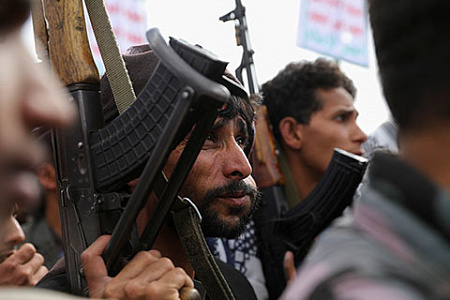
Al-Qaeda in the Arabian Peninsula (AQAP) (recognized as a terrorist organization in Russia and banned) has threatened to retaliate against the United States, Israel and the Persian Gulf countries in response to the humanitarian situation in the Gaza Strip. The leader of the group, Saad bin Atef al-Awlaki, made his first appeal in a year, stressing that AQAP no longer has red lines against opponents. Over the past year, this organization has expanded contacts with the Yemeni Ansar Allah movement (Houthis). According to UN experts, AQAP has ambitions to increase its external operations.
The video of al-Awlaki was distributed through AQAP media platforms. The group’s leader criticizes US President Donald Trump and his entourage for their willingness to support Israel during the war in the Gaza Strip.
“After what happened and is happening to our people in Gaza, there are no red lines for us,” al-Awlaki warned. In his video message, the leader of AQAP appealed to lone terrorists who share the group’s views, calling for attempts on the leaders of Egypt, Jordan and the Gulf states in retaliation for allegedly supporting Israeli actions in the Gaza Strip.
Saad bin Atef al-Awlaki, a native of Yemen, became the head of AQAP in March 2024 after the death of his predecessor, Saudi Khaled Batarfi. In a report published in February 2025, the UN Analytical Support and Sanctions Monitoring Group stated that since then, the new leader of AQAP has strengthened his position. “Building on strong tribal ties, he has restored relations with communities, particularly in the Abyan and Shabwa governorates, and reintegrated supporters of his predecessor Khaled Batarfi,” the report says. “The approximate number of AQAP forces is from 2,000 to 3,000 fighters, including experienced explosives experts and operators of unmanned aerial vehicles.”
According to the UN, the AQAP information unit “used conflicts, including the conflict between Gaza and Israel, to recruit lone terrorists and incite such individuals to commit attacks.” This information unit, the UN says, congratulated the Syrian groups on seizing power on December 8, 2024.
A report by UN experts on Yemen, published in October 2024, provides estimates from regional authorities who fear “a potential revival of AQAP with the support of the Houthis.” Their union began to form recently. “This opportunistic alliance is characterized by security and intelligence cooperation, mutual provision of safe havens, the strengthening of strongholds, and coordination of efforts to attack Yemeni government forces,” the report notes. AQAP and Ansar Allah are discussing joining AQAP in the naval attacks that the Houthis have been practicing for these two years.
As for AQAP, the group’s growing arsenals may reflect its growing regional ambitions. UN experts are concerned about the frequent use by militants of long–range unmanned aerial vehicles, such as those available to the Houthi movement.
Until recently, AQAP’s activities were mainly limited to Yemen. “The group’s plans included establishing control over strategic infrastructure facilities, while several member States noted the relocation of AQAP to areas near the southern coast,” the report says. “However, the group maintained its commitment to external operations, including naval operations in the Red Sea and the Gulf of Aden.” There are fears that Saad bin Atef al-Awlaki’s appeal symbolically anticipates the fact that his associates will soon increase their activity in their area of “responsibility.”
The Houthis have proved to be a difficult opponent for the Trump administration. Despite the fact that Ansar Allah fought the American forces using the most primitive infrastructure, the United States recognizes that the Yemeni group dragged their Navy into the fiercest battles at sea since World War II, sources tell The Wall Street Journal (WSJ). In the coming months, the Pentagon is due to submit its report on how the military campaign against the Houthis has affected its capabilities.
“Over the past year, the US Navy has operated under conditions of intense and prolonged hostilities in the Red Sea, the most active maritime conflict zone in a generation,” Ken Calvert, a Republican Congressman who heads the House of Representatives Subcommittee on Defense, said at a hearing on May 14. – But this constant operational pace has a price. Ships and crews are under heavy strain, deployment is expanding, and readiness for other unforeseen circumstances of global importance is questionable.”
When the Houthis first began attacking ships in the Red Sea in 2023, interfering with shipping in retaliation for the situation in Gaza, representatives of the Central Command of the US Armed Forces suggested that the White House act aggressively to weaken the movement’s capabilities, but the administration of former President Joseph Biden delayed its decision for fear of escalation. By the time the strikes were authorized, the Houthis had changed tactics and moved assets, and American officials often found that their plans and intelligence were rapidly becoming outdated, sources tell the WSJ.
It is likely that the willingness of the Houthis’ ally, AQAP– to step up the campaign against the United States, Israel and Arab countries will complicate the situation in the Red Sea area.
